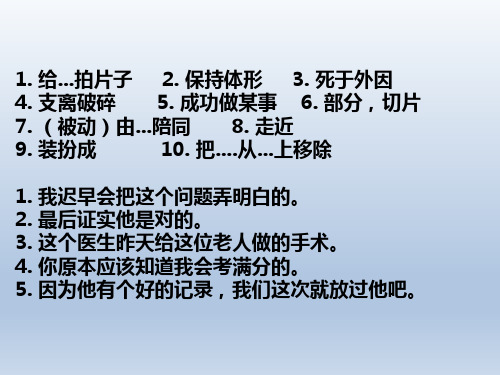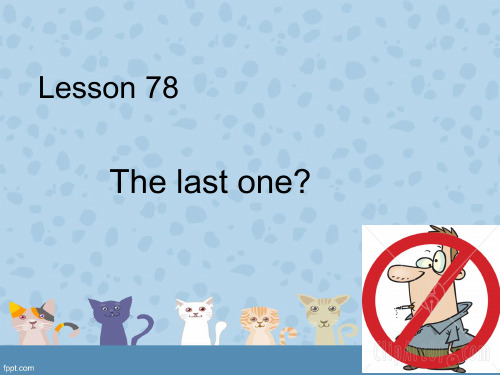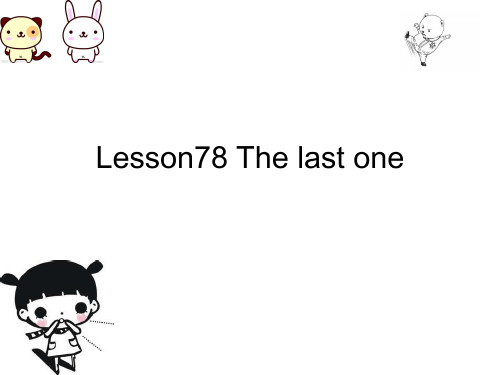新概念英语第二册78课答案
《新概念英语》第二册学习笔记78 77课

《新概念英语》第二册学习笔记78 77课第78课The last one?1、After reading an article entitled 'Cigarette Smoking and Your Health' ...entitled 'Cigarette Smoking and Your Health' 过去分词短语修饰article, 这个句子也可以用定语从句表示:After reading an article that was entitled 'Cigarette Smoking and Your Health'...reading 动词的现在分词,是由动词+ing 构成,可以与系动词be 一起构成进行时,也可以与have/has been 一起构成完成进行时。
例句:They are watching a basement game.He has been collecting stamps since he was a boy.2、I lit a cigarette to calm my nerves.calm 使某人或者某物平静下来,或者安抚某人或者某物例句:He was starting to shake with excitement, and to calm himself he walkedover to the window.3、I had all the usual symptoms of someone giving up smoking.give up sth. 或者give up doing sth. 放弃做某事,不再做某事例句:She never completely gave up hope.4、My friends kept on offering me cigarettes and cigars.keep on doing sth. 继续做某事例句:They kept on walking for a while in silence.5、They made no effort to hide their amusement whenever I produced a packetof sweets from my pocket.make effort to do sth. 表示为了达到某种结果而付出额外的精力例句:Mothers had to made the effort to go out to a play area with their children.whenever 无论何时,无论什么情况例句:Come to see me whenever you feel you have to talk.第77课A successful operation1、The mummy of an Egyptian woman who died in 800 B.C. has just had an operation.B.C. 公元前,是before Christ 的缩写who died in 800 B.C. 限制性定语从句,修饰前面的Egyptian woman.2、The mummy is that of Shepenmut who was once a singer in the Temple of Thebes.who was once a singer...... 限制性定语从句,修饰前面的Shepenmut.3、...doctors have been trying to find out whether the woman died of a rare disease.died of 因......而死,死于......例句:I'm dying of thirst.4、The operation, which lasted for over four hours, proved to be very difficultbecause of the hard resin which covered the skin.逗号后面的部分是which 引导的非限制性定语从句,对前面的operation 起补充说明的作用。
最新新概念英语第二册:第78课课文详解及语法解析

新概念英语第二册:第78课课文详解及语法解析课文详注 Further notes on the text1. an article entitled‘Cigarette Smoking and Your Health’,一篇题为《吸烟与健康》的文章。
在英语中,文章名与书名中的每个单词的第一个字母均大写,不在开头位置的连词、冠词、小品词除外。
entitle的含义为“给……题名/定名”,在这里是过去分词(短语)作定语。
entitle常用于被动语态:The writer hasn't entitled his new book yet.那位作家还没给他的新书写/取名。
The book was entitled The Sun Also Rises.那本书的书名为《太阳照样升起》。
2. I had all the usual symptoms of someone giving up smoking: a bad temperand an enormous appetite. 我具备了戒烟者通常表现出来的所有症状:脾气暴躁和食欲旺盛。
a bad temper and an enormous appetite为symptoms的同位语。
giving up smoking能够看做是someone的定语,即someone who gives up smoking.3. My friends Kept on offering me cigarettes and cigars.我的朋友们持续地向我递香烟和雪茄。
keep on doing sth.表示“继续做某事”、“反复做某事”:The child was crying loudly, but he kept on watching TV.孩子在大声哭,但他却一直看电视。
He kept on phoning her.他持续地给她打电话。
4.They made no effort to hide…他们毫不掩饰地……make no effort表示“根本不作努力”。
78新概念英语第二册78课

Lesson 78
The last one?
• entitle • calm • nerve • concentration • suffer • symptom • temper • appetite • produce • urge • satisfaction • delighted
• v. 以……为名 • v. 使镇定 • n. 神经 • n. 集中,专心 • v. 受苦,受害 • n. 症状 • n. 脾气 • n. 胃口,食欲 • v. 拿出 • v. 力劝,怂恿 • n. 满意,满足 • adj. 欣喜的
Keep the children away from the river. 别让孩子们 去河边。
keep it up
不松懈,保持成绩,继续下去
You've made much progress. Keep it up! 你已取得了
很大进步。继续努力!
keep up with 跟上,不落在……后面 In order to keep up with his classmates, he worked harder than ever. 为了跟上同学,他比以往任何时候都更努力。
Eric is standing there with a book in hand. Eric is standing there, a book in hand.
• Anyway, as Brian pointed out, it is the easiest thing in the world to give up smoking. He himself has done it lots of times!
adj. (海浪)平静的;无风的 n. 平静 the calm before the storm 暴风雨前的平静
新概念英语第二册课后练习题答案详解(第78课)

新概念英语第二册课后练习题答案详解(第78课)新概念英语第二册课后习题Lesson 781. a根据课文第1句After reading an article entitled…能够判断,只有a. Something he had read 与课文的内容相符,其他3个选择都与课文内容不符,所以只能选a.2. c根据课文第10-11行,只有c 是课文所暗示的情况,其他3个选择都与课文实际内容不符,所以应选c.3. b这是一个一般过去时疑问句,因为前面用助动词Did 提问,其谓语动词要用原形才符合语法。
a. lit 是light 的一种过去式和过去分词;c. lighted 也是 light 的过去式和过去分词;d. lighting 是light 的现在分词。
以上3个选择都不是动词原形,所以都不能选。
只有b. light 是动词原形,最合乎语法,所以选b.4. b只有b. on是准确的,因为该句中的谓语动词concentrate 后面只能跟介词on才符合习惯用法。
concentrate on意思是“全神贯注于,专心于”,其他3个词都不能同concentrate搭配使用。
5. c只有c. was hungry 最符合语法和题目意思,而其他3个选择a. had hungry, b. had hunger, d. hungered 都不符合语法和习惯用法,所以选c.6. a该句需要选一个同前一句中的短语动词Kept on offering 意义相同的词组,才能使两个句子意思吻合。
只有a. continued to do this (继续做这种事)与keep on doing 的含义相近。
b. did so, c. kept them 和d. held them 都与keep on doing 的意义不同,所以只能选a.7. c只有c. They were all 与前一句Everybody...was smoking 的意义相同,也符合语法规则. 而a. They was all, b. They all was, d. All of them was 都不符合语法,因为人称代词they后面应该用were而不能用was,所以选c.8. b只有选b. mood 才能与前一句He had a bad temper的意义相吻合。
新概念英语第二册Lesson 78 (共111张PPT)

Listening objective
T: For how long did the writer give up smoking?
Answer: For a week.
Comprehension questions
What did you read an article on? On cigarette smoking and health.
What a re a bad temper and an enormous appetite the symptoms of? Of someone giving up smoking.
Comprehension questions
What happened whenever you produced a packet of sweets? My friends were amused.
New words and expressions
be entitled sth.
这本书的名字叫做“水浒 传”。 The book is entitled Outlaws of the Marsh.
New words and expressions
be entitled sth.
这本书的名字叫做 “哈利.波特”。 The book is entitled Harry Potter.
Comprehension questions
Why did you feel so uncomfortable at the party? Everybody else was smoking.
WORDS
New words and expressions
New words and expressions
新概念2第78课解析

We urged them to stay. I was urged to sign the contract.
★satisfaction • (u) 满意,满足 contentment, pleasure
He took great satisfaction from playing tห้องสมุดไป่ตู้e piano well. • (c) 令人满意(或满足的)事物 something that pleases
• 表原因的连词: • because,as,since,for
My friends kept on offering me cigarettes and cigars.
keep on doing sth. = continue doing sth. 持续不断的做
offer sb. sth. 给某人某物 We offered him a better position.
After reading an article entitled 'Cigarette Smoking and Your Health'
After/before + doing = 时间状语从句 an article entitled 题名为……的文章
• For a whole week I did not smoke at all and during this time, my wife suffered terribly.
★appetite n. 胃口,食欲 appetite 表示的胃口仅对食物而言 Have appetite for sth. 有关于……的食欲 I have good appetite for the ice cream.
(最新版)新概念英语第二册-Lesson-78-The-last-one

enable ensure enhance
light a cigarette
light calm 当她看到他走过来的时候,她的脸亮了起来。 Her face lit up when she saw he was coming. 由于被她那些话所感动,他很难平静下来。 Moved by what she said, he could hardly calm down.
satisfaction n.
/ˌsætɪsˈfækʃn/ 满足,满意,舒服
I enjoy my meal with satistfation. 我心满意足地享受这这顿饭。
delighted adj.
/dɪˈlaɪtɪd/ 高兴的; 欣喜的
突如其来的事情让人感到的开心 I know Frank will be delighted to see you. 我知道弗兰克见到你会 很高兴的。
entitle
vt. 以……为名,取名,给……题名
这本书被命名为《老人与海》.
The book was entitled The Old Man and the Sea.
calm
/kɑ:m/
adj.
平静的; 镇定的; (海洋,天气等) 安静的
calm down
镇定下来
nerve
/nɜ:v/
n.
n. & v. & adj. calm the situation calm their emotions nerve
2019/1/17
I strained every nerve in that experiment. She has an attack of nerves.
新概念二Lesson78 The last one

Translation
1)He kept on saying that he was tired. 2)Keep off the flower bed. 3)You've made much progress. Keep it up! 4)If you keep it up, you'll be able to set up a new world record. 5)Although he walked as fast as he could, he still couldn't keep up with his father. 6) In order to keep up with his classmates, he worked harder than ever. 7)He shut all the doors and windows to keep out the wind. 8)16,000-volt power line. Keep out! 9)It's very cold today. We'd better keep in. 10)When the dog was kept in, it barked loudly.
e.g. I have good appetite for the ice cream.
8.produce v. 拿出 =take out; 生产 →production n.生产
New Words
9.urge v. 力劝,怂恿 ※urge sb. to do sth. 怂恿某人做…… e.g. We urged them to stay. 10.satisfaction n. 满意,满足 →satisfactory adj. 令人满意的 11.delighted adj. 感到高兴的,欣喜的 glad/happy/pleased 感到高兴的
- 1、下载文档前请自行甄别文档内容的完整性,平台不提供额外的编辑、内容补充、找答案等附加服务。
- 2、"仅部分预览"的文档,不可在线预览部分如存在完整性等问题,可反馈申请退款(可完整预览的文档不适用该条件!)。
- 3、如文档侵犯您的权益,请联系客服反馈,我们会尽快为您处理(人工客服工作时间:9:00-18:30)。
新概念英语第二册78课答案【篇一:新概念英语第二册课后答案总汇!】=txt>lesson 1. 1.(b) 2.(c) 3.(b) 4.(d) 5.(c) 6.(a) 7.(d) 8.(b) 9..a) 10.(c) 11.(c) 12.(c)lesson 2. 1.(c.) 2.(d) 3.(c) 4.(c) 5.(a) 6.(b) 7.(b) 8.(a) 9.(d) 10.(c) 1 1.(d) 12.(b)lesson 3. 1.(c) 2.(a) 3.(c) 4.(a) 5.(d) 6.(b) 7.(c) 8.(c) 9.(b) 10.(a) 11.(b) 12.(b)lesson 4. l.(d) 2.(b) 3.(a) 4.(b) 5.(b) 6.(a) 1.(c) 8.(b) 9.(c) 10.(a) 1 1.(c) 12.(c)lesson 5. l.(c) 2.(a) 3.(d) 4.(b) 5.(c) 6.(d)-.(a) 8.(h) 9.(c) lo.fb) ll.(a) 12.(-d)lesson 6. l.(d) 2.(a) 3.(c) 4.(d) 5.(d) 6.(a) 7.(d) 8.(a) 9.(b) lo.(a) 1 1.(d, 12.(a)lesson 7. l.(b) 2.(c) 3.(c) 4.(d) 5.(a) 6.(c) 7.(d) 8.(a) 9.(c) 10.(b) 1 1.(a) 12.(b)lesson 8. l.(d) 2.(b) 3.(b) 4.(a) 5.(c) 6.(c) 7.(b) 8.(b) 9.(a) 10.(d) 1 1.(b) 12.(b)lesson 9. 1 .(b) 2.(b) 3.(d) 4.^a) 5.(a) 6.(b.) 7.(b) 8.(d) 9.(b) 10.(b) 11 .(d) 12.(c)lesson10. l.(a.) 2.(d) 3.(d) 4.(c) 5.(b) 6.fc) 7.(a) 8.(c) 9.(a) 10.(c) 1 1.(c) 12.(a)lesson11. l.(b) 2.(b) 3.(b) 4.(a) 5.(b) 6.(c) 7.(c) 8.(a) 9.(c) 10.(c) 1 1.(b) 12.(d)lesson12. l.(c) 2.(c) 3.(a) 4.(d) 5.(d) 6.(a) 7.(d) 8.(a) 9.(c) 10.(d) 1 1.(a) 12.(a)lesson13. l.(b)2.(d) 3.(b) 4.(c) 5.(a) 6.(b) 7.(b) 8.(c)9.(a) 10.(a)ll.(a) 12.(d)lesson14. 1.(b)2.(c) 3.(a) 4.(c) 5.(d) 6.(b) 7.(c) 8.(b) 9.(c) 10.(b) 11.(b) 12.(b)lesson15. l.(d) 2.(b) 3.(c)4.(b) 5.(c) 6.(d) 7.(a) 8.(d) 9.(c) 10.(c) ll.(c) 12.(b)lesson16. l.(a) 2.(a) 3.(d?4.(a) 5.(b) 6.(a) 7.(d) 8.(a) 9.(d) 10.(d) 1 1.(d) 12.(a)lesson17.1.(d) 2.(b) 3.(b) 4.(d) 5.(c) 6.(c) 7.(b) 8.(a) 9.(a) 10.(c) 11.(a) 12.(d)lesson18. l.(b) 2.(d) 3.(b) 4.(d) 5.(b) 6.(c) 7.(d) 8.(c) 9.(a) 10.(c) 11.(c) 12.(b)11.(c) 12.(c)lesson20. l.(b) 2.(c) 3.(b) 4.(b) 5.(c) 6.(b) 7.(c) 8.(a) 9.(c) 10.(c) 11.(d) 12.(a)lesson21. l.(c) 2.(d) 3.(c) 4.(d) 5.(a) 6.(c) 7.(b) 8.(b) 9.(a) 10.(d) 11.(c) 12.(c)lesson22. l.(d) 2.(b) 3.(d) 4.(d) 5.(b) 6.(d) 7.(a) 8.(c) 9.(d) 10.(a) ll.(b) 12.(b)lesson 23. l.(a) 2.(a) 3.(a) 4.( c) 5.(c) 6.(a) 7.(d) 8.(d) 9.(b) 10.(b) 1 l.(a) 12.(d)lesson 25. l.(c) 2.(b) 3.(b) 4.(a) 5.(b) 6.(c) 7.(d) 8.(b) 9.(a) 10.(a) 1 l.(d) 12.(a)lesson 26. 1 .(a) 2.(d) 3.(c) 4.(b) 5.(c) 6.(d) 7.(d) 8.(a) 9.(b) 10.(d) 1 ] .(b) 12.(d)lesson27. l.(d) 2.(c) 3.(d)4.(d) 5.(d) 6.(b) 7.(a) 8.(d) 9.(d) 10.(c)ll.(c) 12.(c)lesson 28. l.(c) 2.(d) 3.(b) 4.(b) 5.(c) 6.(d) 7.(b) 8.(d) 9.(c) ]0.(d) 1 l.(b) 12.(a)lesson29. l.(b) 2.(c) 3.(c)4.(b) 5.(d) 6.(b) 7.(a) 8.(b) 9.(b) 10.(b)ll.(c) 12.(b)lesson 30. l.(a) 2.(a) 3.(d) 4.(a) 5.(b) 6.(c) 7.(c) 8.(c) 9.(d) 10.(a) 11.(d) 12.(d)lesson 31. l.(d) 2.(b) 3.(a) 4.(c) 5.(a) 6.(a) 7.(d) 8.(a) 9.(b) 10.(c) 1 l.(a) 12.(c)lesson 32. l.(c) 2.(c) 3.(c) 4.(b) 5.(b) 6.(c) 7.(a) 8.(d) 9.(a) 10.(d) 11.(b) 12.(c)lesson 33. l.(d)2.(b)3.(d)4.(a)5.(c)6.(b) 7.(b)8.(c) 9.(c) 10.(c) 11.(a) 12.(c)lesson 34. l.(d) 2.(a) 3.(b) 4.(c) 5.(a) 6.(d) 7.(c) 8.(b) 9.(c) 10.(b) 11.(c) 12.(a)lesson 35. l.(a) 2.(d) 3.(a) 4.(d) 5.(d) 6.(a) 7.(d) 8.(a) 9.(b) ]0.(a) 11.(d) 12.(d)lesson 36. l.(a)2.(d) 3.(d)4.(c)5.(d)6.(c) 7.(c) 8.(b)9.(a) 10.(d)11.(c) 12.(c)lesson 37. l.(c) 2.(b) 3.(b) 4.(b) 5.(b) 6.(d) 7.(a) 8.(c) 9.(d) 10.(b) 1 l.(b) 12.(a)lesson 38. l.(b) 2.(c) 3.(a) 4.(a) 5.(c) 6.(b) 7.(d) 8.(d) 9.(b) 10.(a) 1 l.(d) 12.(d)lesson 39. l.(d) 2.(a) 3.(c)4.(d) 5.(d) 6.(a) 7.(b) 8.(a) 9.(c) 10.(c)ll.(a) 12.(b)11.(b) 12.(d)lesson41. l.(a) 2.(a) 3.(c)4.(d) 5.(c) 6.(b) 7.(b) 8.(a) 9.(d) 10.(a) ll.(c) 12.(b)lesson 42. l.(d)2.(d) 3.(d) 4.(b) 5.(b) 6.(c) 7.(d) 8.(d) 9.(a) 10.(c) 11.(d) 12.(a)lesson43. l.(b)2.(b) 3.(a) 4.(a) 5.(d) 6.(d) 7.(a) 8.(c) 9.(c) 10.(d) ll.(a) 12.(c)lesson 44. l.(c) 2.(b) 3.(c) 4.(c) 5.(c) 6.(b) 7.(d) 8.(a) 9.(b) 10.(a) 11.(b) 12.(d)lesson 45. l.(b) 2.(d) 3.(a)4.(b) 5.(b) 6.(d) 7.(c) 8.(b) 9.(c) 10.(b) 11.(d) 12.(b)lesson 46. l.(a) 2.(c) 3.(d)4.(d) 5.(a) 6.(c) 7.(b) 8.(c) 9.(a) 10.(d) 11.(c) 12.(a)lesson 47. l.(d) 2.(a) 3.(b)4.(a) 5.(d) 6.(a) 7.(a) 8.(d) 9.(d) 10.(c) 11.(a) 12.(c)lesson 49. l.(d) 2.(a) 3.(b)4.(a) 5.(b) 6.(c) 7.(c) 8.(a) 9.(c) 10.(c) 11.(a) 12.(a)lesson 50. 1 .(b) 2.(d) 3.(a) 4.(c) 5.(c) 6.(a) 7.(a) 8.(d) 9.(b) 10.(b) 1 l.(c) 12.(d)lesson 51. l.(b) 2.(c) 3.(d) 4.(d) 5.(d) 6.(a) 7.(d) 8.(c) 9.(a) 10.(d) ll.(d) 12.(b)lesson 52. l.(b) 2.(c) 3.(c) 4.(a) 5.(b) 6.(d) 7.(c) 8.(b) 9.(a) 10.(c) 1 l.(b) 12.(d)lesson 53. l.(c) 2.(d) 3.(a) 4.(c) 5.(c) 6.(c) 7.(d) 8.(c) 9.(d) 10.(a) 1 l.(c-) 12.(c)lesson 54. l.(d) 2.(b) 3.(d) 4.(b) 5.(d) 6.(b) 7.(a) 8.(d) 9.(c) 10.(b) 1 l.(d) 12.(d)lesson 55. ].(a) 2.(a) 3.(b) 4.(d) 5.(a) 6.(a) 7.(c) 8.(a) 9.(b) 10.(d) 1 l.(a) 12.(b)lesson 56. 1 .(c) 2.(a) 3.(c) 4.(c) 5.(a) 6.(c) 7.(a) 8.(b) 9.(b) 10.(c) 1 l.(c) 12.(c)lesson 57. l.(a) 2.(b) 3.(b)4.(b) 5.(b) 6.(d) 7.(c) 8.(d) 9.(c) 10.(b) ll.(d) 12.(a)lesson 58. l.(b) 2.(d)3.(a)4.(a) 5.(c) 6.(b) 7.(d) 8.(c) 9.(a) 10.(d) 11.(b) 12.(d)lesson 59. l.(d) 2.(b) 3.(d) 4.(d) 5.(d) 6.(a) 7.(b) 8.(a) 9.(d) 10.(a) ll.(a) 12.(b)lesson 60. 1 .(b) 2.(a) 3.(c) 4.(b) 5.(c) 6.(b) 7.(a) 8.(b) 9.(a) 10.(c) 11 .(a) 12.(d)ll.(d) 12.(d)lesson62. l.(a) 2.(d) 3.(d) 4.(c) 5.(d) 6.(c) 7.(c) 8.(b) 9.(d) 10.(a) ll.(d) 12.(b)lesson 63. 1 .(d) 2.(b) 3.(a) 4.(a) 5.(b) 6.(d) 7.(d) 8.(a) 9.(c) 10.(d) 11 .(c) 12.(a)lesson 64. l.(c) 2.(c) 3.(c)4.(c) 5.(b) 6.(b) 7.(c) 8.(c) 9.(a) 10.(b) 11.(b) 12.(b)lesson 65. l.(a) 2.(d) 3.(b) 4.(b) 5.(c) 6.(a) 7.(a) 8.(d) 9.(c) 10.(c) 11.(b) 12.(d)lesson 66. l.(c) 2.(b)3.(a) 4.(a) 5.(d) 6.(a) 7.(a) 8.(b) 9.(a) 10.(b) 1 l.(b) 12.(a)lesson 67. l.(d)2.(a)3.(d)4.(d) 5.(d) 6.(d) 7.(b) 8.(b)9.(a) 10.(d)ll.(d) 12.(d)lesson 68. l.(b) 2.(b) 3.(c) 4.(d) 5.(b) 6.(b) 7.(b) 8.(c) 9.(c) 10.(c) ll.(a) 12.(a)lesson 69. l.(a) 2.(b) 3.(c) 4.(b) 5.(b) 6.(c) 7.(d) 8.(a) 9.(a) 10.(b) ll.(c) 12.(d)lesson 70. l.(d)2.(b)3.(c)4.(c) 5.(d) 6.(b) 7.(c) 8.(a)9.(c) 10.(d) ll.(d) 12.(c)lesson 71. l.(b) 2.(d) 3.(b) 4.(b) 5.(c) 6.(c) 7.(d) 8.(b) 9.(b) 10.(c) ll.(b) 12.(a)lesson 73. l.(c) 2.(a) 3.(d) 4.(a) 5.(c) 6.(d) 7.(a) 8.(d) 9.(a) 10.(a) 1 l.(d) 12.(b)lesson 74. l.(b) 2.(d) 3.(c) 4.(c) 5.(d) 6.(c) 7.(a) 8.(c) 9.(b) 10.(c) 1 l.(a) 12.(b)lesson 75. l.(c) 2.(a) 3.(b) 4.(d) 5.(b) 6.(a) 7.(b) 8.(b) 9.(d) 10.(d) 1 l.(c) 12.(c)lesson 76. l.(d) 2.(b) 3.(d) 4.(a) 5.(a) 6.(b) 7.(b) 8.(a) 9.(c) 10.(b) 11.(d) 12.(d)lesson 77. l.(a) 2.(c) 3-(a) 4.(b) 5.(c) 6.(d) 7.(d) 8.(d) 9.(a) 10.(a) 1 l.(b) 12.(a)lesson 78. l.(a) 2.(c) 3.(b) 4.(b) 5.(c) 6.(a) 7.(c) 8-(b) 9.(a) 10.(b) ll.(c) 12.(a)lesson 79. l(b) 2.(d) 3.(c) 4.(c) 5.(a) 6.(d) 7.(b) 8.(a) 9.(d) 10.(a) 1 l.(a) 12.(c)lesson 80. l.(c) 2.(b) 3.(d) 4.(a) 5.(d) 6.(c) 7.(a) 8.(d) 9.(c) 10.(c) 11.(d) 12.(b)lesson 81. l.(d) 2.(a) 3.(a) 4.(d) 5.(b) 6.(b) 7.(d) 8.(c) 9.(b) 10.(d) 11.(b) 12.(d)lesson 82. l.(a) 2.(b) 3.(a) 4.(d) 5.(c) 6.(c) 7.(d) 8.(a) 9.(a) 10.(c) 11.(b) 12.(d)lesson 83. l.(b) 2.(a) 3-(c) 4.(c) 5.(a) 6.(b) 7.(c) 8.(b) 9.(c) 10.(d) 1 l.(a) 12.(b)lesson 84. l.(c) 2.(c) 3.(a) 4.(b) 5.(d) 6.(c) 7.(c) 8.(c) 9.(d) 10.(a) 11.(c) 12.(d)lesson 85. l.(d) 2.(d) 3.(b) 4.(a) 5.(b) 6.(a) 7.(b) 8.(d) 9.(b) 10.(b) ll.(d) 12.(c)lesson 86. l.(b) 2.(c) 3.(a) 4.(b) 5.(b) 6.(b) 7.(d) 8.(c) 9.(a) 10.(b) 1 l.(b) 12.(c)lesson 87. l.(c) 2.(d) 3.(c) 4.(d) 5.(a) 6.(c) 7.(c) 8.(a) 9.(d) 10.(a) 1 l.(a) 12.(d)lesson 88. l.(c) 2.(b) 3.(b) 4.(c) 5.(c) 6.(a) 7.(b) 8.(b) 9.(c) 10.(c) 11.(c) 12.(b)lesson 89. l.(a) 2.(a) 3.(d) 4.(a) 5.(d) 6.(d) 7.(a) 8.(d) 9.(b) 10.(d) 11.(d) 12.(b)lesson 90. l.(b) 2.(c) 3.(c) 4.(c) 5.(a) 6.(b) 7.(c) 8.(b) 9.(a) 10.(d) 1 l.(d) 12.(d)lesson 91. l.(d) 2.(b) 3.(c) 4.(b) 5.(c) 6.(d) 7.(b) 8.(b) 9.(c) 10.(b) ll.(c) 12.(b)lesson 92. l.(b) 2.(c) 3-(d) 4.(c) 5.(b) 6.(a) 7.(b) 8.(b) 9.(a) 10.(d) ll.(c) 12.(a)lesson 93. l.(c) 2.(d) 3.(b) 4.(a) 5.(c) 6.(c) 7.(c) 8.(d) 9.(c) 10.(b) 1 l.(d) 12.(b)lesson 94. l.(a) 2.(b) 3.(c) 4.(b) 5.(a) 6.(d) 7.(a) 8.(c) 9.(d) 10.(a) ll.(b) 12.(c)lesson 95. l.(d) 2.(a) 3.(b) 4.(a) 5.(d) 6.(c) 7.(d) 8.(c) 9.(a) 10.(c) 1 l.(d) 12.(c)?????????【篇二:新概念英语第二册82课课后习题详细答案】案 key to written exercises1.难点练习答案1 wash up2 laugh at3 washed4 laughed5 wash2.多项选择题答案1. a根据课文第3-4行…these ?monsters?…are simply strange fish, 可以推测只有a. are probably unusual fish (或许是不寻常的鱼)与课文的内容相符,而其他3个选择都与课文所描述的情形不符。
